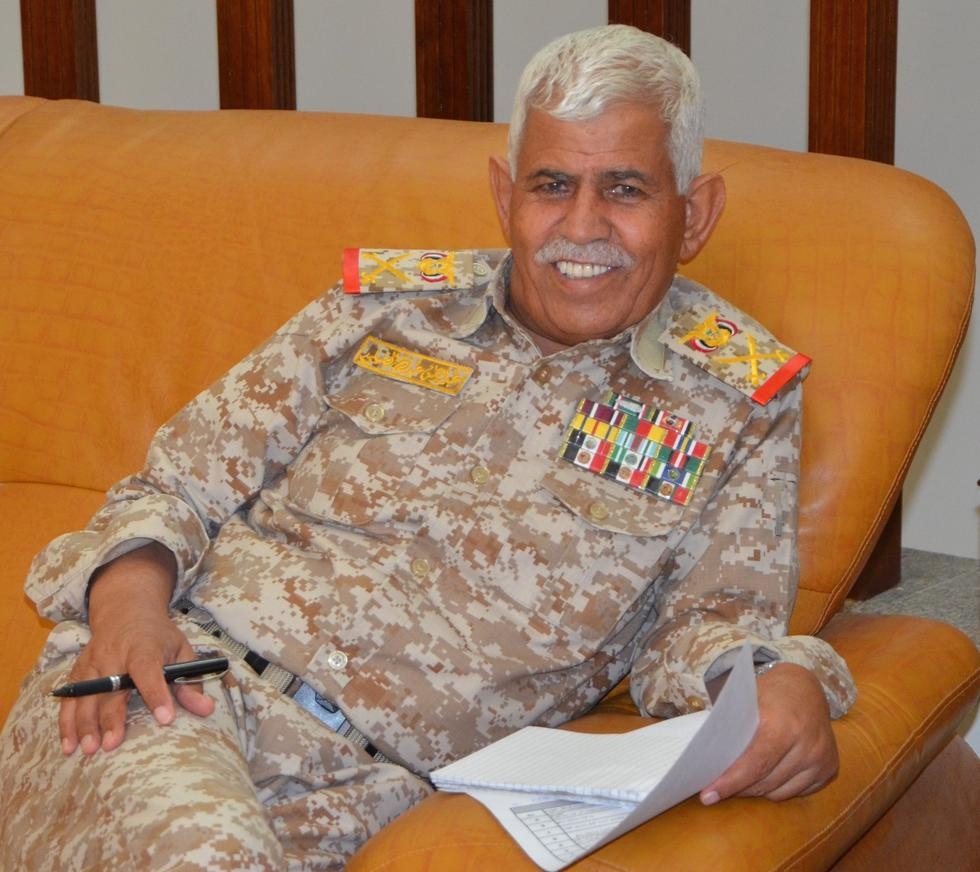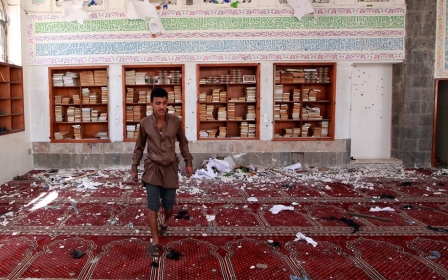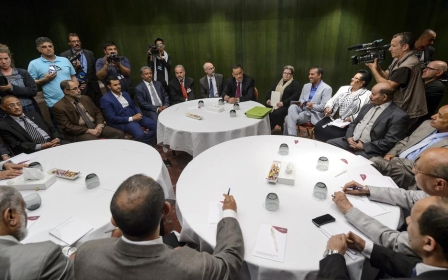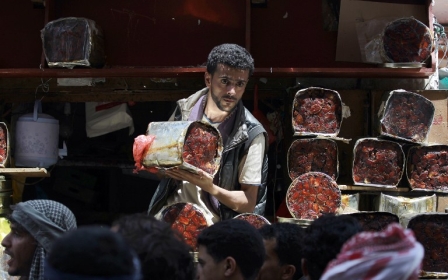EXCLUSIVE: Interview with top Yemeni general in Wadi Hadramout

SEIYUN, Yemen - There are many reasons for describing General Abdul Rahaman al-Halili as the most influential and important army official in Yemen nowadays.
He is the commander of the largest military region in the country – the First Military Region in Wadi Hadramout, east Yemen – and has remained resilient despite the country’s ongoing brutal civil war.
Halili has resisted Al Qaeda’s relentless attacks and is widely known for having brought the militants to their knees, having cleared them from strongholds in Hadramout.
Speaking exclusively to Middle East Eye in the presidential palace in the city of Seiyun, the capital of Wadi Hadramout, General Halili explained why he has been successful.
“The First Military Region is strong and coherent because it has been kept away from political and partisan wrangling. Our loyalty is to the country only,” he said.
Yemen has seen an unprecedented level of violence this year, hit by an onslaught of airstrikes from a Saudi-led coalition amid a fierce ground battle taking place between the Houthi movement and forces opposing their expansion across the country.
The Houthis, backed by forced loyal to former president Ali Abdullah Saleh, sent their troops to the southern port city of Aden, forcing the country’s President Abd Rabbuh Mansour Hadi to flee to Saudi Arabia.
Six military regions have been militarily involved either with the Houthis or supporters of the exiled president, except al-Halili’s region, which has largely remained untouched.
With the absence of the governor of Hadramout, who fled the province’s capital after an al-Qaeda assault in April, General Halili acts as the de facto ruler of the largest and wealthiest province in Yemen.
“We enjoy stability and security despite violence across the country. He is the ruler in practice as local government officials do not show up at their offices,” a bookseller from Seiyun told MEE on condition of anonymity because of security concerns.
The importance of Halili’s military division stems from the vast swathe of land that he rules and the number of army brigades under his command. The First Military Region extends to the country’s border with Oman and the long border with Saudi Arabia in the Empty Quarter. The region includes five combat brigades with thousands of soldiers.
Halili said that he “fully” backs President Hadi and that he and his forces receive commands from Hadi only.
“We support legitimacy,” he said in reference to Hadi's international recognition, adding that he is in regular contact with the exiled president and his government in Riyadh.
During the interview, he refused to be recorded and agreed to pose for the camera only after many requests.
Halili’s critics say the army general is “a Houthi in disguise” and that he avoids expressing his true opinion so as to avoid being bombed by Saudi warplanes.
The 64-year-old turned up at the controversial Houthis' constitutional declaration in February, a move that was described by critics as consenting to a coup by the Iranian-supported group.
Weeks after Saudi Arabia launched its bombing campaign in late March, Halili was quoted in local press declaring his support to Hadi.
Halili told MEE that his visit to the presidential palace during Houthis constitutional declaration was “not premeditated”.
“My seniors including the minister of defence rang me and asked me to come to the presidential palace without giving me more information. I followed the orders and did not know what was happening there,” he said.
Despite not mentioning the Houthis in his answers, Halili said that he would fight against any armed group that approaches Wadi Hadramout.
“We would fight with all our power against any cell or militia that seeks to undermine stability and security in Wadi Hadramout.”
In the interview, the army general avoided saying that he backed the Saudi-led airstrikes.
“I do not need to say it [that I am backing the airstrikes] since I have already showed my supported to the legitimacy [of President Hadi and his government],” he said.
Al-Qaeda and Islamic State
Halili’s predecessor, General Mohammed Al Sumali, was dismissed from his post in July 2014 in the wake of a swift attack by al-Qaeda on banks and security offices in Seiyun not too far from his office. The militants also used to roam freely in large cities including Qaten and carried out bloody assaults on military posts that claimed the lives of dozens of security personnel.
Halili swiftly launched many raids on al-Qaeda’s hiding places and recaptured Qaten and other areas from the militants. Deadly attacks have considerably reduced in recent months.
“Al-Qaeda’s activities have decreased but still pose a danger not only on Wadi Hadramout but also to the wider world,” he said.
Since July 2014, the army general has survived five assassination attempts by al-Qaeda militants.
“These attacks made me more determined to restore stability and security,” he said with an air of defiance.
In April, Halili’s neighbouring Second Military Region in the coastal city of Mukalla, the capital of Hadramout province, crumbled in the face of hundreds of al-Qaeda militants who took control of the city and two army brigades. The militants’ new gains enabled them to control of most of Hadramout’s vast coast.
Confirming previous reports about the presence of Islamic State (IS) group in Wadi Hadramout, Halili said that there are “a few” militants in rugged areas in Sar Valley in Hadramout.
“They are hiding in rough places to avoid security raids,” he said.
Early this year, the former director of National Security, Ali al-Ahmadi, said in an interview with a Kuwaiti newspaper that IS were in Sar Valley fighting al-Qaeda, who they are in a feud with.
Halili said that al-Qaeda’s battles with the Houthis in many places have eroded the militants’ threat and lessened their pressure on his military region.
Wadi Hadramout is also one of the places were the United States have carried deadly, and controversial, drone strikes, which ostensibly target al-Qaeda militants.
Halili refused to give his take on how effective the drone strikes have been in purging militants, but he did deny cooperating with the Americans in fighting al-Qaeda and said that he had no plans to send any troops to the al-Qaeda-controlled Mukalla.
New MEE newsletter: Jerusalem Dispatch
Sign up to get the latest insights and analysis on Israel-Palestine, alongside Turkey Unpacked and other MEE newsletters
Middle East Eye delivers independent and unrivalled coverage and analysis of the Middle East, North Africa and beyond. To learn more about republishing this content and the associated fees, please fill out this form. More about MEE can be found here.




